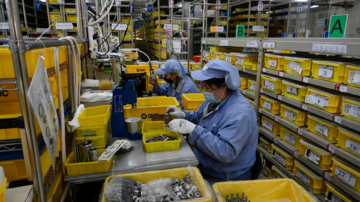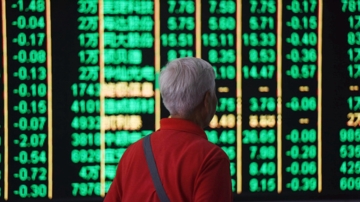【新唐人2013年10月07日訊】近年來,大陸房價不斷高攀。隨著房地產泡沫的日趨嚴重,大陸房地產企業的經營壓力也越來越大。最近,一些房企公開發聲,認為目前的土地供應政策造成「地王」不斷出現,各地方政府從中獲取了最大利益,老百姓淪為最終買單者,而房企本身處境也越發艱難。
多年來,大陸各地方政府片面追求GDP,熱衷重復性建設,造成債臺高築,瀕臨破產的邊緣。大陸審計署發佈的審計公告表明,從1979年至今,土地出讓收入,一直是中共地方政府主要的還債來源。而各級政府的最大財政收入,則來源於土地拍賣。
在10月3號結束的「2013蘭州房地產業展示交易會」上,一些房地產企業呼籲大陸當局:改變目前的土地供應制度,取消土地拍賣。
今年以來,國內多個城市「地王」不斷出現。繼「中糧地產」以23億6千萬元,拿下北京朝陽區孫河西甸村地塊,折合樓面價高達每平方米4萬6千元,「新鴻基」以217億7千萬搶得上海徐家匯地段,成交樓面價達每平方米3萬7千3百元。
北京天則經濟研究所副所長 馮興元:「房價的60%左右是屬於政府拿走的部分,包括國有土地轉讓收入、稅費,也就是說,老百姓花這麼多錢買,實際上政府拿了一大塊。」
面對大陸各地不斷湧現的「地王」,房地產開發商們苦不堪言。他們認為:「地王」的出現只能導致一贏雙損的結局,也就是,各地方政府通過拍賣拿到了超高的壟斷利益,開發商利潤變薄,購房者則要直接為房價上漲買單。
大陸房地產投資顧問鄭先生:「現在的信號就證明:房地產商扛不住了。大的房地產商都是國企、央企,『國進民退』嘛。民營的房地產商是苟延殘喘。國企和央企如果經營不善的話,大家都知道最後買單的是誰。」
大陸房地產投資顧問鄭先生分析,實際上,房地產商早就知道自己是在給政府打工,現在房企呼籲取消土地拍賣,有背後的深層因素。
鄭先生:「房地產遭遇的風險,是中國很多行業面臨著深層次經濟危機的一個集中體現。」
但奇怪的是,雖然中國經濟增長趨緩、面臨硬著陸的危機,大陸各地房價卻一直不斷飆高,房地產過熱的勢頭難以遏制。
大陸媒體報導,即使在蘭州等二、三線城市,「地王」也不斷湧現。 8月26號,福建「順隆實業有限公司」以14億多元的高價,拍到了蘭州市高速公路天水路出口附近的地塊。雖然當局號稱在調控房價,但今年以來,蘭州市房價一直上漲,絲毫看不出有回頭的跡象。蘭州一些主要的房地產項目,售價每平方米超過萬元的樓盤比比皆是。
北京「天則經濟研究所」副所長馮興元分析,造成樓價上漲有多種因素,包括:當局對影響經濟增長的不穩定因素進行掩蓋,信息不透明,不斷大量增發貨幣,政府對土地資源的壟斷,國有房企不斷充當「地王」角色,老百姓在其他方面基本沒有投資空間等。
馮興元表示,要改變這種局面,當局應該放開供給渠道。
馮興元:「政府恰恰要退出。一個是政府至少不要成為唯一的土地出讓方﹔第二,政府不應該以房地產公司的面目出現,來抬高土地價格。」
早前,大陸國土資源部公布的數據顯示,上半年,全中國的土地出讓合同價款,已高達1萬7千億元,增幅達77.3%,創歷史新高。
採訪/易如 編輯/李謙 後製/葛雷
Developers in China Want End to administrative land sales
In recent years, housing prices in China
have never stopped skyrocketing.
As the real estate bubble worsens, Chinese real estate
enterprises are feeling greater pressure
in keeping up their businesses.
Most recently, some of them stated publicly that
it is the current land supply system that is responsible for
the continuously record-breaking high land prices.
They argue that local governments get the most benefits
out of the process; while ordinary Chinese people have to
pay the huge bill and the situation for developers
is also turning worse.
Through all these years, the Chinese Communist Party’s
local governments have been one-sidedly pursuing GDP
growth via continuous construction.
Because of this, many of them are burdened with huge debts
and are on the verge of bankruptcy.
Reports from the CCP’s National Audit Office show that,
land transfer fees have always been the major income source
for local governments to pay off debts since 1979.
Most revenue for all levels of the CCP’s governments
also comes from land sales.
The “2013 Lanzhou Real Estate Trade Fair” just ended
on Oct. 3rd.
During the event, some real estate enterprises called on
the CCP authorities to reform the current land supply system,
such as by abolishing land sales by local governments.
This year, many Chinese cities have
kept seeing record-high land prices.
COFCO Property bought a residential site in Beijing's Xidian,
Chaoyang District, at 2.36 billion yuan ($384.6 million),
which equals to a unit price of 46,000 yuan ($7,500)
per square meter.
Sun Hung Kai Properties won an auction for a commercial
site in Shanghai’s Xujiahui District for a record total of
21.77 billion yuan ($3.5 billion), equaling a unit price of
37,300 yuan ($6,000) per square meter.
Feng Xingyuan, deputy director of Beijing Tianze
Institute of economics: “The governments have taken away
60% of the house prices via land transfer fees and taxes.
In other words, among the money that Chinese people
have to pay for buying a home, the majority drops into
pockets of the CCP’s government.”
As land prices continue to break records all over China,
developers are suffering more than ever.
They are saying skyrocketing land prices
can only benefit one side but harm all the others.
That is, local governments make extremely high profits by
monopolizing land auctions.
Meanwhile, developers are given less space to make profits
and customers have to pay for much higher house prices.
Mr. Zheng, real estate investment counselor: “This is
the message now: Private developers can no longer hold up.
The biggest developers are all state-owned ones, resulting
from the policy of ‘enriching the state prior to its people’.
Private developers are barely sustaining their businesses.
We all know that if state-owned enterprises are poorly
managed, someone will pay the bill for them.”
Mr. Zheng says that, in reality, developers had realized a long
time ago that they were simply working for the government.
Therefore there must be underlying reasons for them to
start calling for abolishment of administrative land sales.
Mr. Zheng: “The crisis faced by the real estate industry is
indeed a reflection of similar economic troubles that
have been bothering China’s many other industries.”
What is strange is that despite the slowdown of
economic growth and the economic hard landing crisis,
China’s house prices continue to surge everywhere.
It seems that the real estate overheat cannot be stopped.
Chinese media reported that, even land prices in second-
or third-tier cities, such as Lanzhou, are also at record highs.
On Aug. 26th, Fujian’s Shunlong Real Estate Co. won an
auction for a site close to the Tianshui Road exit of
Lanzhou Highway for over 1.4 billion yuan ($228.7 million).
Although the local authorities claimed that they were making
administrative adjustments, Lanzhou’s house prices have
always been increasing all year long
and there is no sign of a stop to this trend.
Unit prices of over 10,000 yuan ($1,600) per square meter
have become quite common among the city’s
major real estate projects.
Feng Xingyuan says there are many factors
leading to the increase of house prices.
Feng says those factors include the authorities' covering up
negative impacts on economic growth, a lack of transparency,
excessive money printing, the government's monopolizing
land resources, state-owned house developers' continuously
buying up the majority of the land,
the people having little space to invest, and so on.
Feng says that to change the current situation,
the CCP authorities should open more sources of land supply.
Feng Xingyuan: “The government should exit the process.
First, it should not be the only source of land transfer.
Second, it should be not use the form of real estate
enterprises to raise land prices.”
According to statistics previously released by the CCP’s
Ministry of Land and Resources, China's total land transfer
contract value in the first half of 2013 reached a historic high
of 1.7 trillion yuan ($212.5 billion), increasing by 77.3%.
多年來,大陸各地方政府片面追求GDP,熱衷重復性建設,造成債臺高築,瀕臨破產的邊緣。大陸審計署發佈的審計公告表明,從1979年至今,土地出讓收入,一直是中共地方政府主要的還債來源。而各級政府的最大財政收入,則來源於土地拍賣。
在10月3號結束的「2013蘭州房地產業展示交易會」上,一些房地產企業呼籲大陸當局:改變目前的土地供應制度,取消土地拍賣。
今年以來,國內多個城市「地王」不斷出現。繼「中糧地產」以23億6千萬元,拿下北京朝陽區孫河西甸村地塊,折合樓面價高達每平方米4萬6千元,「新鴻基」以217億7千萬搶得上海徐家匯地段,成交樓面價達每平方米3萬7千3百元。
北京天則經濟研究所副所長 馮興元:「房價的60%左右是屬於政府拿走的部分,包括國有土地轉讓收入、稅費,也就是說,老百姓花這麼多錢買,實際上政府拿了一大塊。」
面對大陸各地不斷湧現的「地王」,房地產開發商們苦不堪言。他們認為:「地王」的出現只能導致一贏雙損的結局,也就是,各地方政府通過拍賣拿到了超高的壟斷利益,開發商利潤變薄,購房者則要直接為房價上漲買單。
大陸房地產投資顧問鄭先生:「現在的信號就證明:房地產商扛不住了。大的房地產商都是國企、央企,『國進民退』嘛。民營的房地產商是苟延殘喘。國企和央企如果經營不善的話,大家都知道最後買單的是誰。」
大陸房地產投資顧問鄭先生分析,實際上,房地產商早就知道自己是在給政府打工,現在房企呼籲取消土地拍賣,有背後的深層因素。
鄭先生:「房地產遭遇的風險,是中國很多行業面臨著深層次經濟危機的一個集中體現。」
但奇怪的是,雖然中國經濟增長趨緩、面臨硬著陸的危機,大陸各地房價卻一直不斷飆高,房地產過熱的勢頭難以遏制。
大陸媒體報導,即使在蘭州等二、三線城市,「地王」也不斷湧現。 8月26號,福建「順隆實業有限公司」以14億多元的高價,拍到了蘭州市高速公路天水路出口附近的地塊。雖然當局號稱在調控房價,但今年以來,蘭州市房價一直上漲,絲毫看不出有回頭的跡象。蘭州一些主要的房地產項目,售價每平方米超過萬元的樓盤比比皆是。
北京「天則經濟研究所」副所長馮興元分析,造成樓價上漲有多種因素,包括:當局對影響經濟增長的不穩定因素進行掩蓋,信息不透明,不斷大量增發貨幣,政府對土地資源的壟斷,國有房企不斷充當「地王」角色,老百姓在其他方面基本沒有投資空間等。
馮興元表示,要改變這種局面,當局應該放開供給渠道。
馮興元:「政府恰恰要退出。一個是政府至少不要成為唯一的土地出讓方﹔第二,政府不應該以房地產公司的面目出現,來抬高土地價格。」
早前,大陸國土資源部公布的數據顯示,上半年,全中國的土地出讓合同價款,已高達1萬7千億元,增幅達77.3%,創歷史新高。
採訪/易如 編輯/李謙 後製/葛雷
Developers in China Want End to administrative land sales
In recent years, housing prices in China
have never stopped skyrocketing.
As the real estate bubble worsens, Chinese real estate
enterprises are feeling greater pressure
in keeping up their businesses.
Most recently, some of them stated publicly that
it is the current land supply system that is responsible for
the continuously record-breaking high land prices.
They argue that local governments get the most benefits
out of the process; while ordinary Chinese people have to
pay the huge bill and the situation for developers
is also turning worse.
Through all these years, the Chinese Communist Party’s
local governments have been one-sidedly pursuing GDP
growth via continuous construction.
Because of this, many of them are burdened with huge debts
and are on the verge of bankruptcy.
Reports from the CCP’s National Audit Office show that,
land transfer fees have always been the major income source
for local governments to pay off debts since 1979.
Most revenue for all levels of the CCP’s governments
also comes from land sales.
The “2013 Lanzhou Real Estate Trade Fair” just ended
on Oct. 3rd.
During the event, some real estate enterprises called on
the CCP authorities to reform the current land supply system,
such as by abolishing land sales by local governments.
This year, many Chinese cities have
kept seeing record-high land prices.
COFCO Property bought a residential site in Beijing's Xidian,
Chaoyang District, at 2.36 billion yuan ($384.6 million),
which equals to a unit price of 46,000 yuan ($7,500)
per square meter.
Sun Hung Kai Properties won an auction for a commercial
site in Shanghai’s Xujiahui District for a record total of
21.77 billion yuan ($3.5 billion), equaling a unit price of
37,300 yuan ($6,000) per square meter.
Feng Xingyuan, deputy director of Beijing Tianze
Institute of economics: “The governments have taken away
60% of the house prices via land transfer fees and taxes.
In other words, among the money that Chinese people
have to pay for buying a home, the majority drops into
pockets of the CCP’s government.”
As land prices continue to break records all over China,
developers are suffering more than ever.
They are saying skyrocketing land prices
can only benefit one side but harm all the others.
That is, local governments make extremely high profits by
monopolizing land auctions.
Meanwhile, developers are given less space to make profits
and customers have to pay for much higher house prices.
Mr. Zheng, real estate investment counselor: “This is
the message now: Private developers can no longer hold up.
The biggest developers are all state-owned ones, resulting
from the policy of ‘enriching the state prior to its people’.
Private developers are barely sustaining their businesses.
We all know that if state-owned enterprises are poorly
managed, someone will pay the bill for them.”
Mr. Zheng says that, in reality, developers had realized a long
time ago that they were simply working for the government.
Therefore there must be underlying reasons for them to
start calling for abolishment of administrative land sales.
Mr. Zheng: “The crisis faced by the real estate industry is
indeed a reflection of similar economic troubles that
have been bothering China’s many other industries.”
What is strange is that despite the slowdown of
economic growth and the economic hard landing crisis,
China’s house prices continue to surge everywhere.
It seems that the real estate overheat cannot be stopped.
Chinese media reported that, even land prices in second-
or third-tier cities, such as Lanzhou, are also at record highs.
On Aug. 26th, Fujian’s Shunlong Real Estate Co. won an
auction for a site close to the Tianshui Road exit of
Lanzhou Highway for over 1.4 billion yuan ($228.7 million).
Although the local authorities claimed that they were making
administrative adjustments, Lanzhou’s house prices have
always been increasing all year long
and there is no sign of a stop to this trend.
Unit prices of over 10,000 yuan ($1,600) per square meter
have become quite common among the city’s
major real estate projects.
Feng Xingyuan says there are many factors
leading to the increase of house prices.
Feng says those factors include the authorities' covering up
negative impacts on economic growth, a lack of transparency,
excessive money printing, the government's monopolizing
land resources, state-owned house developers' continuously
buying up the majority of the land,
the people having little space to invest, and so on.
Feng says that to change the current situation,
the CCP authorities should open more sources of land supply.
Feng Xingyuan: “The government should exit the process.
First, it should not be the only source of land transfer.
Second, it should be not use the form of real estate
enterprises to raise land prices.”
According to statistics previously released by the CCP’s
Ministry of Land and Resources, China's total land transfer
contract value in the first half of 2013 reached a historic high
of 1.7 trillion yuan ($212.5 billion), increasing by 77.3%.








